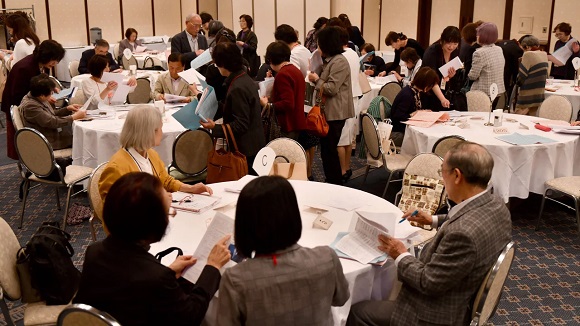It’s a steamy summer afternoon in the Japanese city of Osaka, where a group of around 60 men and women have gathered for a session of “omiai,” or matchmaking, to find true love.
They mingle away, hopping from one end of the conference room at the Sakai Chamber of Commerce building to another as they assess potential matches – and the competition.
But this is no ordinary speed-dating event.
Few of the participants are talking about their favourite hobbies, movies or restaurants, or indeed, even about themselves. They are talking about their grown-up, still single children who they are hoping to match up and marry off.
One woman, in her 60s, speaks proudly of her 34-year-old son, a public elementary school teacher. A man in his 80s talks affectionately about his career-minded son, 49, who works as a controller at an electric company.

Toshifumi Kitamura/AFP/Getty Images
Each of the parents has forked out 14,000 yen ($96) to attend this event, hosted by the matchmaking agency Association of Parents of Marriage Proposal Information. And they are all hoping to meet someone just like them; a parent whose still single daughter or son might be the perfect match for their own lonesome child.
It’s not that Japan, a notoriously work-obsessed nation where time is at a premium, hasn’t tried out the more direct approach to speed-dating, where the youngsters do it for themselves. It’s more that leaving the young to it doesn’t seem to be working.
With rising living costs, poor economic prospects and the demanding work culture conspiring against them, fewer Japanese today are opting to get married and have children. Their parents, alarmed at their diminishing chances of grandchildren, are stepping in.
“The idea that it is okay for parents to help their children get married in this way has become more widespread,” said the company’s director Noriko Miyagoshi, who has been organizing matchmaking events for almost two decades.
In the past people might have been ashamed of coming to these events, she added.
“But times have changed.”
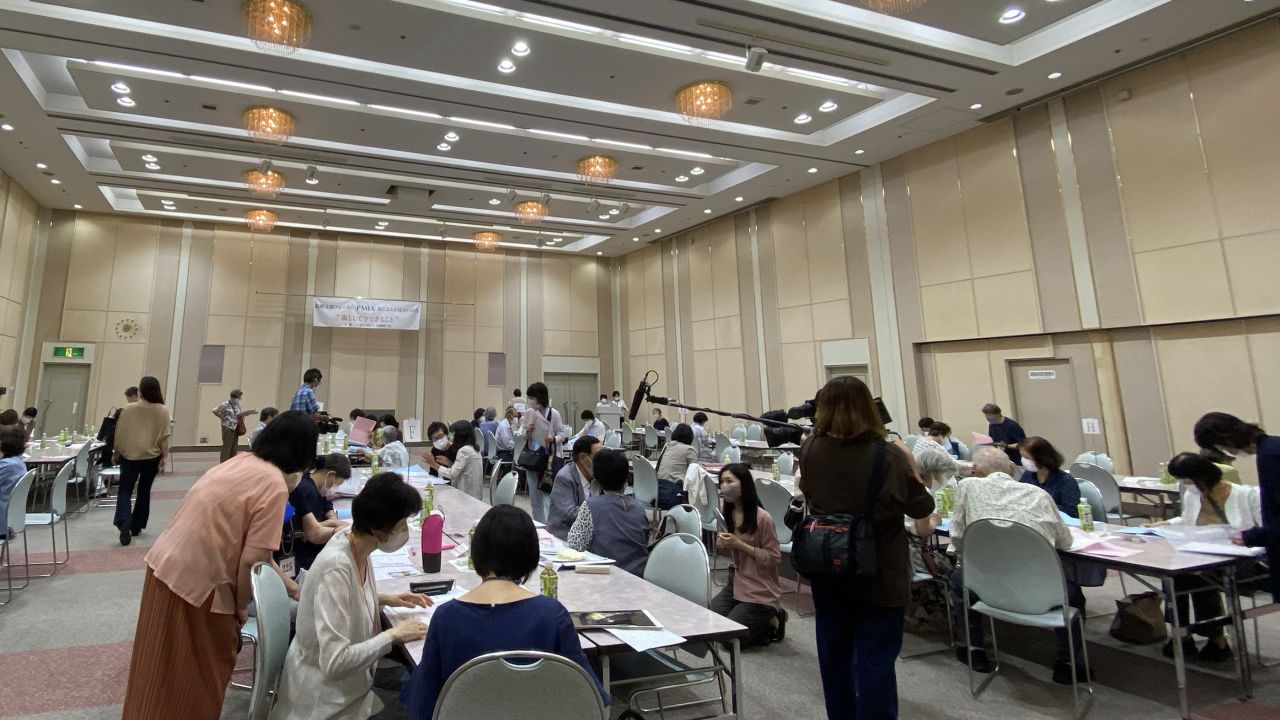
Junko Fukutome/CNN
Marriage crisis
The same forces that are driving these parents to the Osaka conference room have been playing havoc with the demographics of the world’s third biggest economy.
In Japan today, there are fewer marriages, fewer births and fewer people. The population has long been on a downward trajectory and in the year up to January, according to government data, it suffered a record plunge of 800,523 to 125.4 million.
Behind that plummeting population is the ever-falling number of marriages and births.
In 2021, the number of newly registered marriages fell to 501,116, the fewest since the end of World War II in 1945, and just half the number recorded in the 1970s. And when people do get married, they are doing so at later stages of life, leaving less time to make babies. The median age for tying the knot in 2021 was 34 for men, up from 29 in 1990, and 31, up from 27, for women.
Alongside the drop in marriages has been a slide in the fertility rate, which last year hit a record low of 1.3, far below the 2.1 required to maintain a stable population.
All of that has left a growing headache for a government that must somehow fund the healthcare and pensions of a rapidly aging population with an ever-dwindling number of young tax payers.
Earlier this year, Prime Minister Fumio Kishida unveiled a multitrillion-yen plan aimed at boosting the birth rate, warning it was a case of “now or never.”
Among the incentives offered to parents were a monthly allowance of 15,000 yen ($100) for every child they had up to two years old and 10,000 yen for those three and above.
But James Raymo, an East Asian Studies expert at Princeton University, said trying to boost the birth rate was unlikely to work without first boosting the marriage rate.
“It’s not really an issue of married couples having fewer children. It’s about whether people are getting married in the first place,” Raymo said.
Failing to address the issue would have grave consequences, said sociologist Shigeki Matsuda, from Chukyo University in Aichi, Japan.
“Major concerns include a decline in the country’s overall economic strength and national wealth, difficulty in maintaining social security, and a loss of social capital in local communities,” he said.
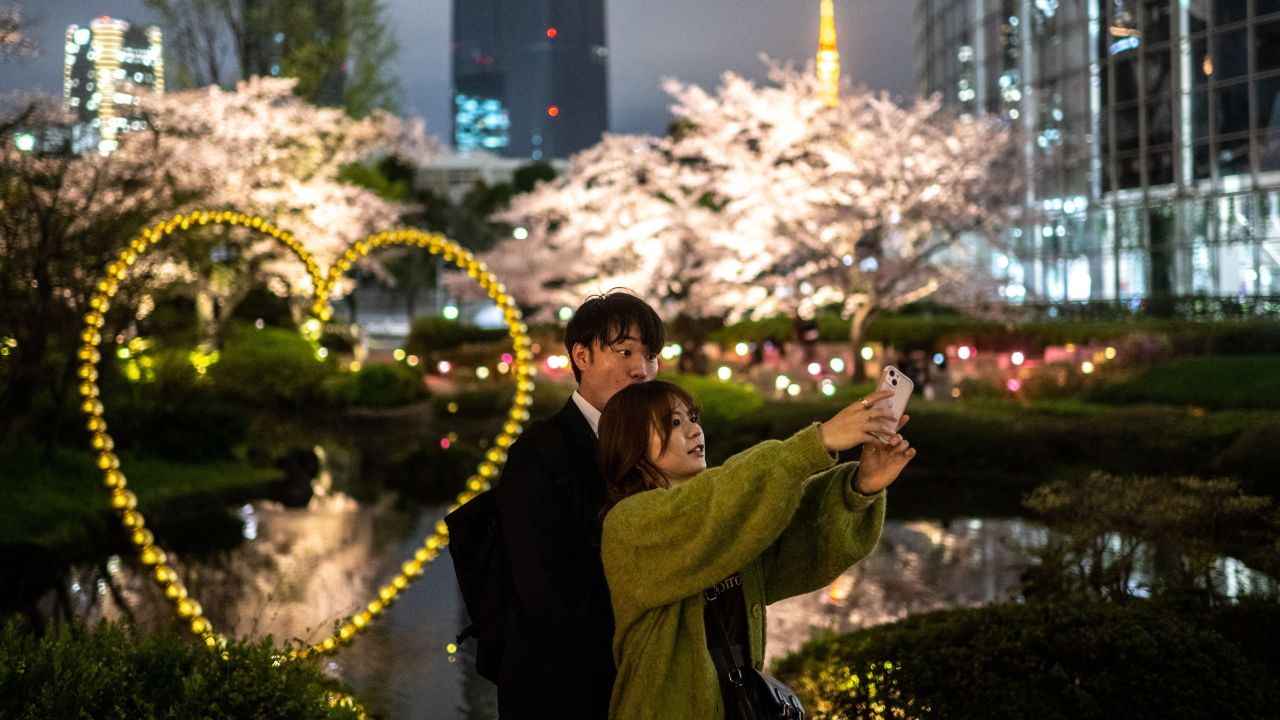
Philip Fong/AFP/Getty Images
Turn offs
So what’s turning people off?
Matsuda said it’s not that people no longer have the desire to get married per se – some 80% still do, according to a survey by the National Institute of Population and Social Security last year.
It’s more that they believe the obstacles in the way are insurmountable.
Young Japanese have faced poor employment prospects and flat wages since the 1990s, he pointed out. According to the Organisation for Economic Co-operation and Development, the average annual paycheck in Japan increased only 5% from 1991 to 2021 – compared to a rise of 34% in other G7 economies such as France and Germany.
“This has weakened their economic capacity to start marriages,” Matsuda said.
Raymo had a similar view, saying Japan’s high cost of living and notoriously long working hours made things worse.
“If you’re working 70 hours a week, then of course you won’t have a suitable partner, because you have no time to meet one,” he said.
The depth of the crisis can be glimpsed in supermarket aisles and convenience stories, where shelves are full of pre-packaged meals catering to one, or in the streets full of tiny apartments tailor-made for single life, Raymo added.
“This is a country that’s designed to make single living as easy as possible,” he said.
For women, economic costs are not the only turn off. Japan remains a highly patriarchal society in which married women are often expected to take the caregiver role, despite government efforts to get husbands more involved.
“Although Japan is legally equal between men and women, in reality, there is a deep-seated belief among men and women that women should still bear children and raise them, while men should work outside the home,” said Miyagoshi, the matchmaker.
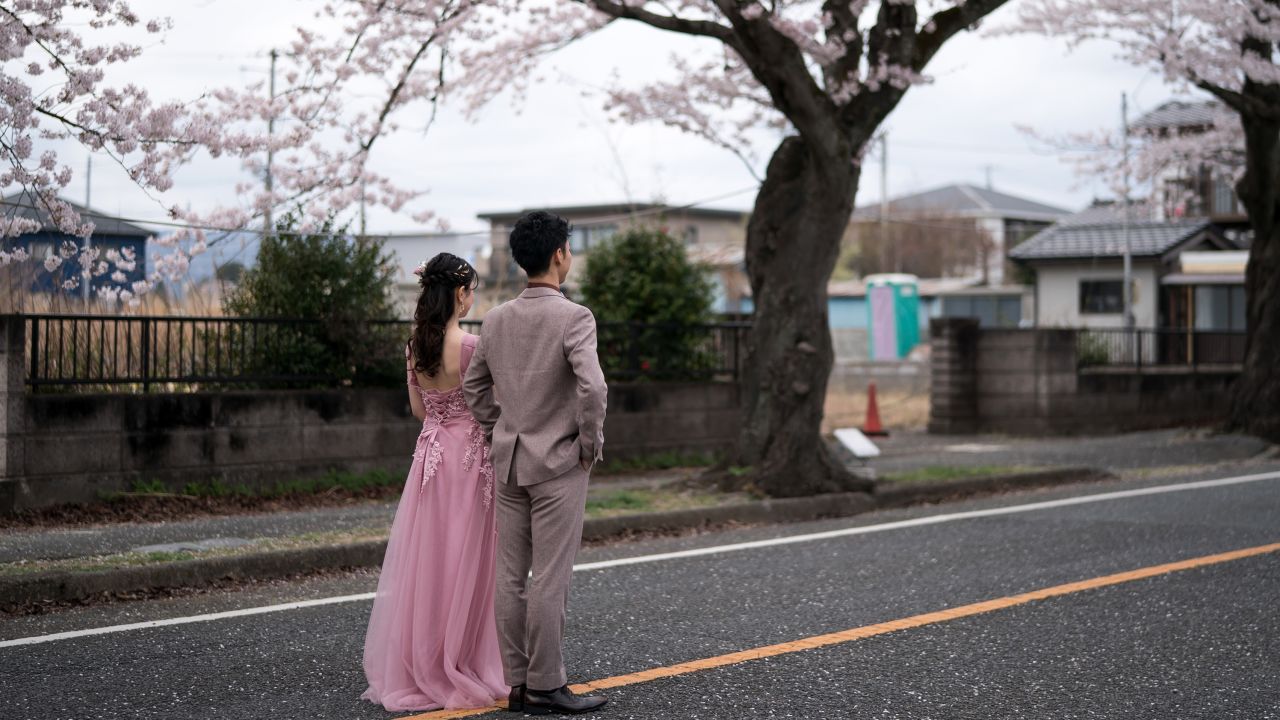
Tomohiro Ohsumi/Getty Images
No need for ‘awkward conversations’
Back at the Sakai Chamber of Commerce, light music plays to sooth the mood in what might otherwise seem an unlikely setting for Cupid to draw his bow.
CNN attended the gathering on the condition that those taking part were quoted anonymously to protect their privacy.
Some of the parents have attended a few sessions already, others are first timers, and the stakes are high. Each of them has come armed with a completed questionnaire about their offspring, which asks things like whether they would be willing to relocate if things work out. The parents also carry profile pictures, many of them professionally shot, some showing young women dressed to impress in traditional kimonos.
Most of the photos are of spinsters and bachelors in their 30s and 40s; the youngest is 28 and the eldest 51, and they have a range of professions, from doctors and nurses to civil servants and secretaries.
One couple, in their 80s, say their 49-year-old son has been spending too much time at work to pay attention to his love life.
They have always wanted grandchildren so they decided to attend the matchmaking after reading about it in a newspaper.
Another couple, in their 70s, say their 42-year-old daughter doesn’t date because she wants to be free to hang out with her college friends whenever she wants. They want someone who can take care of their daughter, and say she is happy for them to do the searching.
Others have been asked by their children to attend the event. One mother, in her 60s, says her 37-year-old daughter has become anxious at seeing friends her age getting married and having children. She says she regrets not pushing her daughter to find a partner when she was younger.
The agency estimates that about 10% of those it matches up go on to get married, though it says the true figure could be higher because parents don’t necessarily let them know how their children’s relationships progress.
One mother, whose daughter married through the matchmaking service, recalled lining up to meet the parent of a popular candidate and feeling surprised when she got a call back asking if their offspring could meet.
At first sight, she said, “my daughter just started staring at him and that’s when I knew she had found her match.”
The pair are now married.
She says there are advantages to involving only the parents in the beginning; they can be more upfront in expressing what their children want and don’t want.
“[The children] don’t have the awkward conversations that would sometimes be remembered for years in a relationship,” she said.
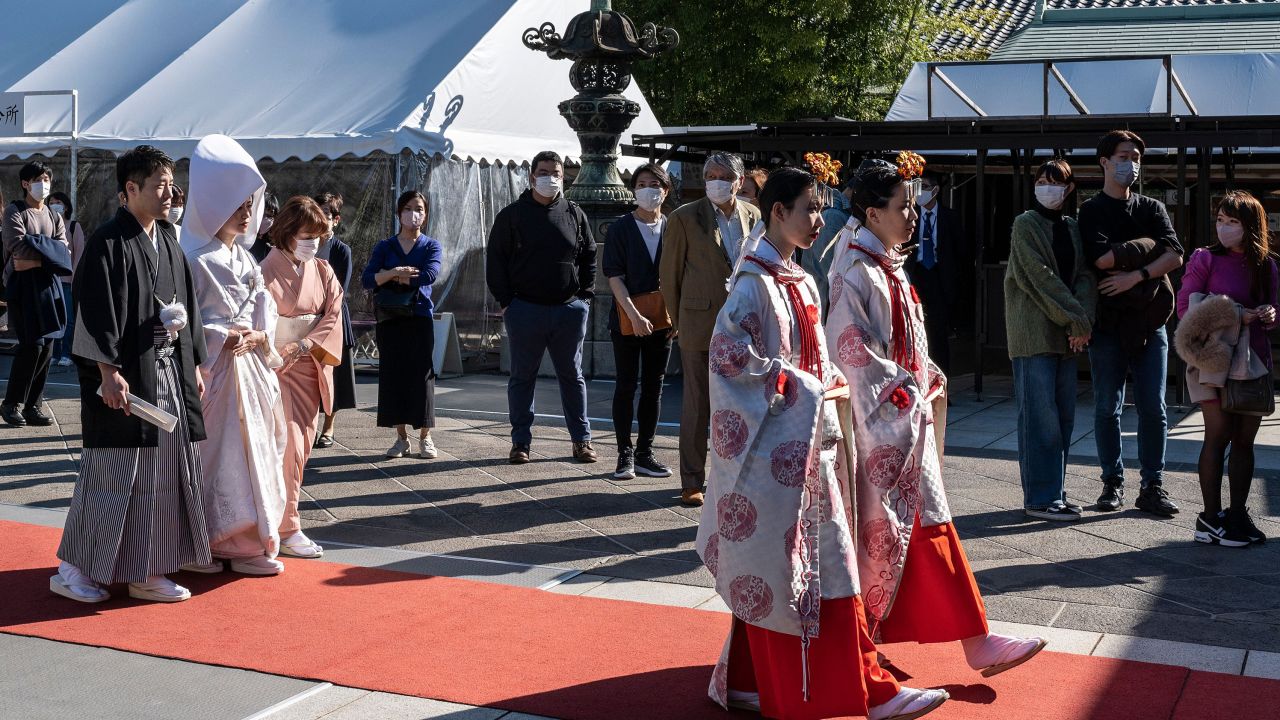
Richard A. Brooks/AFP/Getty Images
Search for a match, hope for a grandchild
For many of the parents, it is the lure of grandchildren that draws them to the matchmaking events, says Miyagoshi.
She often comes across parents of men in their 40s who are searching for women in their late 20s and early 30s.
One father complained that he hadn’t been able to set up his 40-year-old son despite exchanging his profile with 10 other parents, she said.
On a closer look, she found out the father had turned down all the women in their mid-30s and those more educated than his son. He also rejected a candidate who did not have male siblings – women in this situation are seen as a burden in the eyes of traditional Japanese parents who believe they will be distracted by having to take care of their in-laws when they grow old.
But however great the yearning for grandchildren, Miyagoshi says she always emphasizes to parents that their children should come first.
“No matter how much the parents feel for each other, their children must be on board. No matter how much parents want grandchildren, the children must be willing to have children,” she said.
It may sound an unlikely thing for a professional matchmaker to say, but Miyagoshi believes in “go-en”, a Japanese concept referring to romance that sprouts from meeting the right person at the right time.
“No matter how much effort you put into it, sometimes it will not work out. That’s marriage,” she said.
CNN

